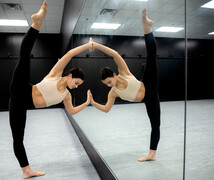For Kristina Vegh of Raleigh, running is an essential part of life. After attending college on a running scholarship, she traveled to countries like Turkey, Estonia, and Austria to race. Following the birth of her first child, Vegh was determined to return to running as soon as possible. She quickly learned that running postpartum wasn’t as simple as lacing up her tennis shoes. After struggling with injuries following her first three pregnancies, Vegh sought help from Duke Health physical therapist, Stacey Head, PT. She helped Vegh learn to strengthen her pelvic floor so she could return to running postpartum safely.
Postpartum Running Problems
Vegh was eager to start running again after her first child was born in 2014. “I wanted to be the person who returned to running as quickly as I could,” she said. Vegh waited six weeks and jumped right back in. Soon after, she injured her groin and started experiencing difficulties controlling her urine while running and after sneezing.
“Leakage of urine may be considered normal postpartum, but it’s not,” said Head. In addition to urine leakage, pain in the pelvis, hips, and knees or a feeling of heaviness between your pubic bone and tailbone can all be indicators of a weak pelvic floor -- the group of muscles and connective tissue that support the bladder, bowels, and reproductive organs.
Vegh experienced the same problems after her second and third pregnancies. When she became pregnant a fourth time in August 2022, Vegh took a more proactive approach. “I didn’t want to wait until an injury happened again,” Vegh said. This time, she started physical therapy before giving birth to prevent injuries postpartum.
Kristina Vegh with her family in Raleigh, NC.
Pelvic Floor Physical Therapy at Duke
Vegh’s search for the right physical therapist led her to Duke. “I researched and found Stacey and her specialization, and I was so excited about that,” said Vegh. With 22 years of experience as a physical therapist, Head has a background in sports and specializes in pelvic health physical therapy, particularly postpartum.
When Vegh began physical therapy in September 2022, she was impressed by the personal care and attention she received at Duke, noting Head quickly became like a coach for her. “She wanted to know my background, what my goals were, and why I was seeing her, which was really helpful,” said Vegh.
Vegh received a thorough evaluation, including personalized assessments of her running form to identify weaknesses. Each session, Head helped her work through pain points of running during pregnancy, until eventually she stopped in favor of gentler walking and swimming exercises. Throughout, the focus remained on building a strong pelvic floor and core through exercises such as bridges and single-leg squats.
“It was all about strengthening the foundation,” said Vegh. “I knew this was going to be a springboard for running later.”
Postpartum Return to Running
Now, over eight weeks postpartum, 39-year-old Vegh is slowly returning to running with guidance from Head and feels great. “The goal is just to get started,” she said. “I don't have any races in mind. I just feel like I light up when I make that time to go for a run.” Head has provided her with a flexible running schedule, running a few minutes at a time and building up slowly.
Reflecting on it now, Vegh believes she had unrealistic expectations about the effects of pregnancy on the body and the pelvic floor. “I was entirely unaware of all the issues that could spring up because of pelvic floor weakness, and so my thinking was that all I had to do was get my abs and legs strong again and the return to running would go smoothly,” she said.
Head likens pregnancy and birth to any other strain or injury to the body that requires time to heal and build back strength. She and Vegh believe most pregnant and postpartum runners could benefit from pelvic floor physical therapy. “If we think about someone who has an orthopedic surgery, whether it's an ACL surgery or rotator cuff surgery, most of the time those patients aren't just going back to their activities,” Head said. “There's a process. There's a rehab protocol and progression that they follow to get them back to being able to do their activity.”







